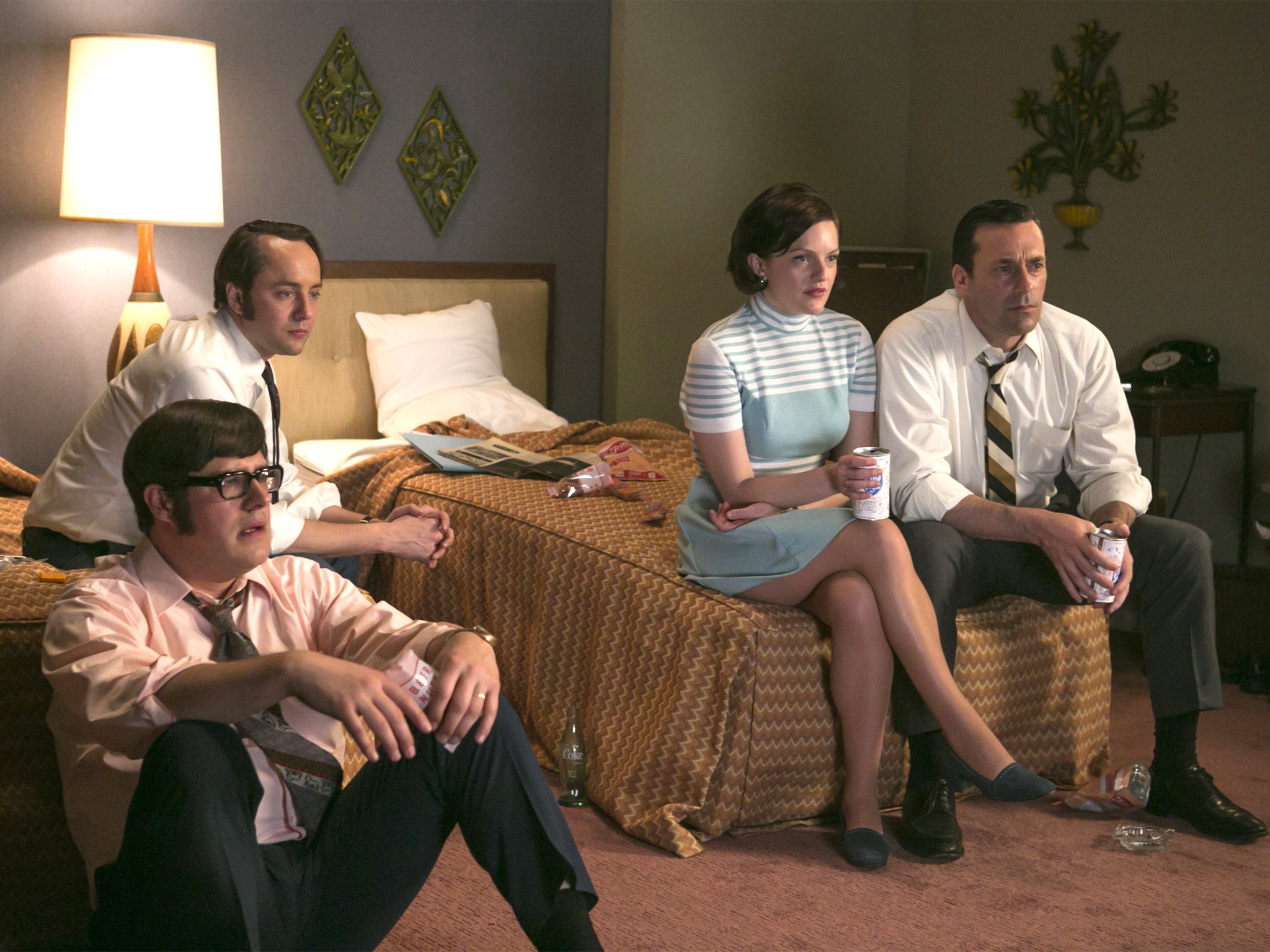The Moon belongs to everyone, but the best things – sang some geezers, some time ago – are free. Alas, unless you have Sky, Mad Men isn't free, but it remains one of the best things.
Last night, in the finale to part one of the show's final season (it's following Breaking Bad and The Sopranos in splitting its ending in two), Mad Men entered the lunar age. Viewers have been ticking off these epochal events (Marilyn, Kennedy, MLK, Kennedy again) since 1960 (or 2007) and now it's the one that marked the end of the Sixties. Which seems as good a place as any to mark the beginning of the end of Mad Men itself.
Creator Matthew Weiner has used the world of advertising as a cipher to show how we got from there to here. That's been done through race, sex, class, politics and everything else you'd expect to define a society in flux. In 1969, technology has been thrown into the mix, mainly with the acquisition of an IBM 360 the size of a small office. Sometimes the metaphor was unsubtle – the machine literally replaced the agency's creative lounge – sometimes less so. Episode four of this season was called The Monolith and contained dozens of allusions to a near-contemporary 2001: a Space Odyssey.
Of course, the rise of the robots has put Mad Men's humans in flux. As protagonist Don Draper has battled with his demons, the world as changed around him. Not only has he been on the brink of losing both his transcontinental marriage and his job, but de facto agency boss Jim Cutler has been framing the future for Sterling Cooper & Partners as one where the IBM is the star employee profiled in the Wall Street Journal. It's enough to make you miss the whisky-and-skirt days of early Mad Men.
So, as the world changed and Neil Armstrong landed on the Moon, so Mad Men lurched violently into the 1970s.
Don has spent most of his career avoiding working for a big, soulless agency, but – having found himself in breach of contract and on the brink of being hoicked out of the firm – that looks like his future.
After we lost Bert Cooper – who slipped, shoeless, off this mortal coil, his last words applauding Armstrong's copywriting chops. Roger Sterling (the wonderful, wonderful John Slattery) stepped up to the plate and negotiated a corporate sell-out that would make all the partners millions, save Don's job, and diddle Jim Cutler and useless, avuncular Don stand-in Lou Avery. It was a triumph. Of sorts.
It felt a bit like moments in previous series, where Roger, Don and others avoided being sold to McCann by tricking their British owners, or in the middle of series six when the agency merged with Cutler, Gleason, and Chaough, and it wasn't unsatisfying for it.
First, we saw Roger inhabit Bert's role as the leader of the company, hours after being told her wasn't a leader. Then we saw Don pass the baton to Peggy to present the pitch for the Burger Chef account (she nailed it, with what fans will know as a "Carousel moment"). In fact, one of Weiner's greatest achievements is to make something as banal as a firm pitching to advertise fast food (or a camera, or a cigarette, or whatever), seem worthy of the viewers' tears and devotion.

Watch Apple TV+ free for 7 days
New subscribers only. £8.99/mo. after free trial. Plan auto-renews until cancelled

Watch Apple TV+ free for 7 days
New subscribers only. £8.99/mo. after free trial. Plan auto-renews until cancelled
Then, just as Peggy spelled out the change in the zeitgeist ("Dad likes Sinatra, son likes the Rolling Stones"), we got the most bizarre scene in Mad Men's 85 episodes yet with Don hallucinating the very dead Bert and a bevy of dancing secretaries serenading him with one of Frank's favourites, "The Best Things in Life Are Free". The kind of sentiment you can only express in an advertising agency once you've carked it.
Subscribe to Independent Premium to bookmark this article
Want to bookmark your favourite articles and stories to read or reference later? Start your Independent Premium subscription today.


Join our commenting forum
Join thought-provoking conversations, follow other Independent readers and see their replies